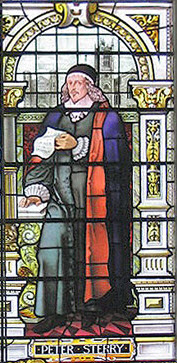Peter Sterry facts for kids
Peter Sterry (born 1613 – died 19 November 1672) was an English religious thinker. He was known for his independent ideas. He was connected to a group called the Cambridge Platonists. This group was important during the time of the English Civil War.
Peter Sterry worked as a chaplain for important leaders. He was a chaplain for Robert Greville, 2nd Baron Brooke, who was a general for the Parliament. Later, he worked for Oliver Cromwell. He was also a member of the Westminster Assembly. This was a group of religious leaders who discussed church rules. Sterry was a leading Puritan preacher. He was connected to the English Council of State. Some people made fun of him in a book called Hudibras.
Contents
Peter Sterry's Life Story
Peter Sterry was born in Surrey, England. He went to St. Olave's Grammar School in Southwark. In 1629, he started studying at Emmanuel College, Cambridge. He became a Fellow there in 1636. But he left this position quite soon after.
Sterry gave important speeches to Parliament. In 1649, he spoke after the cities of Drogheda and Waterford gave up. In 1651, he spoke after the battle of Worcester. His speeches were sometimes hard to understand. One person said his preaching was "too high for this world and too low for the other."
After King Charles II returned to power in 1660 (this was called the Restoration), Sterry stopped working publicly. He moved to a community in East Sheen. He continued to preach in places like Hackney. He also preached in private religious meetings called conventicles.
A writer named Vivian de Sola Pinto said good things about Sterry. He noted that Sterry had "intellectual freedom" and a "flexible mind." He also had "imagination, tolerance and loving-kindness." Sterry loved learning and beauty.
Today, there is a special stained glass window that remembers him. It is in the chapel of Emmanuel College. The college also keeps many of his writings that have not been published.
Peter Sterry's Beliefs
Peter Sterry was described as a 'Platonizing Puritan'. This means his Puritan beliefs were mixed with ideas from the ancient Greek philosopher Plato. He was also called an 'Origenian universalist'. This means he believed that all people would eventually be saved. He was also linked to the ideas of Jakob Böhme, a German mystic. However, Sterry did not agree with Böhme on everything.
He followed the ideas of Benjamin Whichcote. Whichcote was a main leader of the Cambridge Platonists. Sterry was a mystic. He talked about a 'hidden music' in the world. He also believed in millenarianism. This means he expected the Second Coming of Jesus to happen soon. In the early 1650s, he thought 1656 would be a very important year.
Sterry and another person named William Erbery were sometimes confused with a group called Ranters. Ranters had very extreme religious ideas. But Sterry wrote against their 'errors'. He also supported early Quakerism. Quakers are a religious group known for their simple worship. Sterry spoke up for them when James Nayler, a Quaker leader, was criticized by members of Parliament in 1656.
Robin Parry, a writer, said Sterry was unique. He was a Puritan who loved art and poetry. He was a Platonist who believed in God's plan for everything. He was a deep thinker and a mystic. He was also a Calvinist who believed in universal salvation.
Here is an example of Sterry's ideas: The love of God makes everything beautiful. This beauty is like a perfect song. It is God's goodness in Christ. Christ is the first and most beautiful image of God. Every other image of God is found in Him.
Peter Sterry's Family
The Oxford teacher Nathaniel Sterry was Peter Sterry's younger brother.
Peter Sterry's Writings
- The Spirit Convincing of Sinne (1645) – a sermon for Parliament.
- England's Deliverance from the Northern Presbytery, Compared with its Deliverance from the Roman Papacy (1652) – a sermon about the Battle of Worcester.
- Way of God with his people in these nations (1656) – a sermon for Parliament.
- Free Grace Exalted (1670)
- A Discourse of the Freedom of the Will (1675)
- The Rise, Race, and Royalty of the Kingdom of God in the Soul (1683)
- The Appearance of God to Man in the Gospel (1710)
 | Toni Morrison |
 | Barack Obama |
 | Martin Luther King Jr. |
 | Ralph Bunche |


